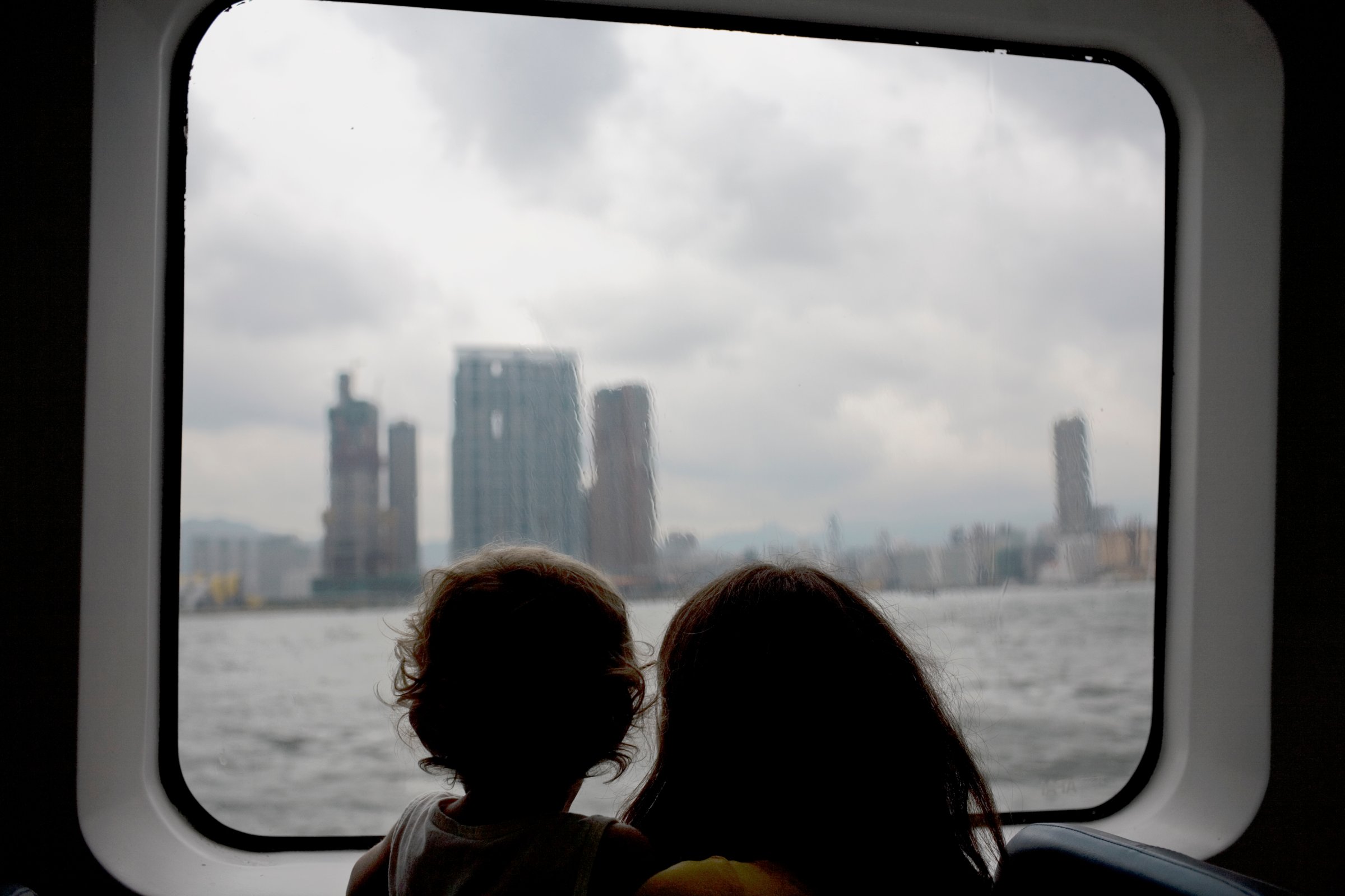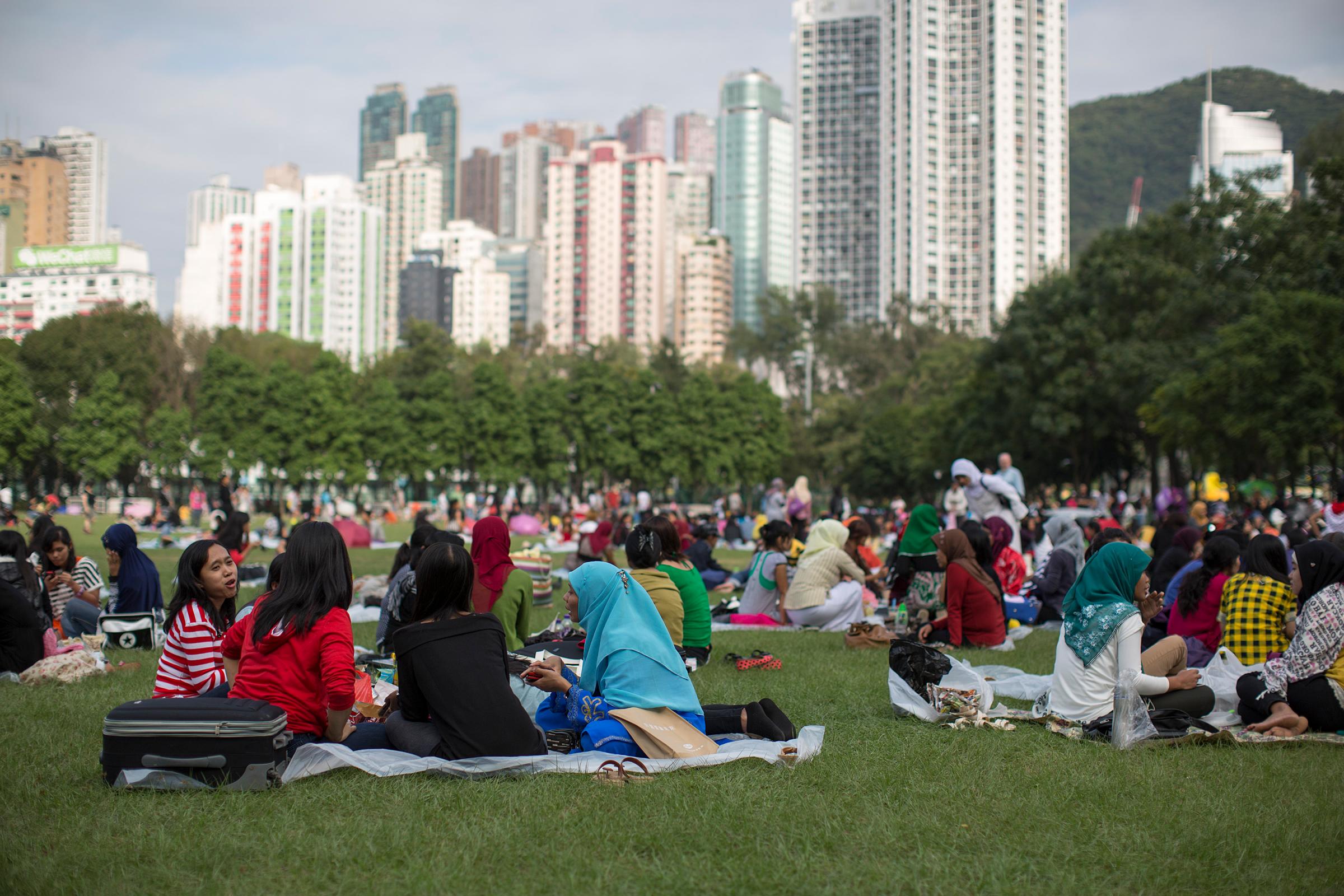
Incense wafts through the damp stairwell of a six-storey residential building on Hong Kong’s Kowloon peninsula. The first floor houses a Chinese medicinal shop. A hotel that rents rooms by the hour sits on the second. On the fifth floor, a 40-year-old Indonesian mother sprinkles the shoulders of her 5-year-old autistic son with baby powder. Plastic crinkles as she unpacks a red and white uniform, and dresses him for his first day of kindergarten.
First days of school are usually filled with excitement, eagerness and a little apprehension. But for the boy’s mother, who agreed to be interviewed by TIME on condition that she be referred to only by the initial B, the feeling is one of dread. That’s because her son’s future is uncertain: he is undocumented.
“I couldn’t sleep thinking about how I could get money for school fees,” she tells TIME, speaking in Bahasa Indonesia through a translator. Anticipation over her eligibility for a school-fee waiver from the Education Bureau often keeps her awake in the bed she shares with her son, known as S.
B, like 340,000 other migrants, came to Hong Kong seeking better economic opportunities as a foreign domestic worker. The majority of these live-in helpers hail from the Philippines and Indonesia, and they provide vital care services to thousands of working Hong Kong and expat families.
The Hong Kong government bars domestic workers from the right to abode after seven years of residence in the territory, unlike any other foreign national. And even though the overwhelming majority are women and predominantly of reproductive age, there is no child-care-protection system in place that anticipates or provides for the existence of any children they may bear. This absence has deprived hundreds of children like S who are born to illegal migrants, of basic medical care, education and identification papers.
Before school, S lays on a sticky white mat curled beside his mom, absorbed by YouTube clips of Disney’s Frozen that play on a taped-together tablet. Looking over his shoulder are B’s three other roommates, who also work as domestic helpers, with whom she shares the two-bedroom apartment. They all chipped in to buy the $12 tablet from an electronic refuse stall for his birthday in November 2015.
Five years ago, B’s former employers abruptly terminated her contract. She lost her job, and by default her home. Domestic helpers in Hong Kong must live with their employers and the city’s immigration law allows them just two weeks to find a new contract if they are fired or quit. For B, two weeks was simply not enough time to find another job, especially as she needed to file a claim for illegal termination. She was automatically rendered a criminal overstayer.
Read More: Two Years After Erwiana, Has Life Improved for Hong Kong’s Domestic Workers?
B wanted to return to her home in Java, Indonesia’s main island. But after having a child with her Pakistani boyfriend of five years — who she says abandoned her after he found out about the pregnancy — her family refused to accept her back. B feels that she and her son would be in danger if she returned. Her family has since cut off communication with her. B found out through friends on Facebook that her mother died during Ramadan in 2015.
B and her son surrendered to the Immigration Department in April 2012 and are now both on recognizance papers — temporary permission slips to remain in Hong Kong while the government evaluates the validity of her claim. But in the meantime, B is barred from working, meaning she has no way to pay the monthly $270 for kindergarten if the Education Bureau decides she is not eligible for the waiver. She could work illegally, as some do to make ends meet, but she refuses to take that risk. “If I’m arrested,” she says, “who will take care of my son?”
The only reason B has access to any sort of school or welfare is because of PathFinders, an NGO in Hong Kong that helps migrant children, pregnant women and mothers navigate Hong Kong’s complicated immigration system. Because B says returning home could jeopardize her son, she filed a claim for asylum-seeker status. She now receives a paltry $150 in monthly food coupons, rent assistance and transportation allowance from the government. “It’s not enough,” she says. “But I have to make it enough.”
Approval of B’s asylum claim is slim. Of the 9,214 asylum cases the government has received since 2009, the Immigration Department has accepted just 72. But despite the scant aid available, B still wants to stay. “In Hong Kong, you can have no friends and no family, but still can manage,” she says. “In Indonesia, you have nothing.”

Even if the child’s father is a permanent resident, foreign domestic workers still struggle to obtain the right to abode for their children. A is a 34-year-old former domestic worker from Indonesian Borneo who came to Hong Kong in 2003. She lost her job in February 2010, and soon after, became pregnant. A couldn’t find new employment during the allotted two-week period so she lived with various friends until surrendering to immigration in August 2010.
A says the father provided funds to abort the child, but the procedure failed. “It almost ended my life,” she tells TIME. “But he said try again.”
The father gave her money for a second time, but she says it was stolen. Once her son, known as R, was born in November 2010, his father denied any relation to him. PathFinders helped her to file a paternity claim, and after three years R received his permanent residence in February 2013. During those three years, R lived on welfare with his mother, who has been barred from working for more than six years now. Lacking proper access to health care, R suffered from severe eczema.
Though her son is now a permanent resident, A is not guaranteed residency in Hong Kong. “There’s no derivative right of a parent to gain residency,” says Peter Barnes, a human-rights lawyer who has overseen several landmark cases related to the right of abode in Hong Kong.
Boarding the bus to school, B grips her son’s hand tightly, her nails painted with henna. S has run away several times before, on Hong Kong’s subway system known as the MTR, and at the park. B says his autism has shown signs of improvement since PathFinders found a pro-bono doctor to treat him for speech therapy once a month. “He couldn’t even call me mama,” she says. Before the NGO intervened, B had no access to health care. She didn’t receive her first prenatal check up until she was eight months pregnant. After S was born, she says he couldn’t see a doctor until he was 2 months old because it took a long time to obtain a birth certificate. “That was a very difficult time because no one could support me,” she says. Since his birth, the hospital bills her monthly for $13,350 because she is considered a “non-eligible” person.
Read More: Asylum Seekers Struggle to Survive in One of the World’s Most Expensive Cities
In a statement to TIME, Hong Kong’s Hospital Authority says that given the government’s heavily subsidized public hospital services, “priority [has] to be reserved for [eligible persons].” While the authority will offer treatment to nonlocals in life or death situations, once they’re stabilized, “they are expected to seek continual treatment at their homeland or other private facilities in Hong Kong.” According to 2016 hospital figures, 146 children were born to “noneligible” mothers.
Hong Kong does not keep a public record of births by foreign domestic workers, but PathFinders says it has assisted 4,200 babies, children and women since 2007, while the number of child-protection cases it deals with has increased annually by 20%, and 53% in 2015 alone. “I think we’re only seeing the tip of the iceberg in terms of unregistered children in Hong Kong,” says Kay McArdle, the organization’s CEO. Stories of children — and not only those born to domestic helpers — living underground without official identities, have haunted Hong Kong for years.
PathFinders has managed all sorts of cases of undocumented children born in prisons, abandoned in hospitals, living in brothels. “We can’t have anymore of these massive headline cases of babies being abandoned, or being given birth to … on the MTR, or flushed down the toilet, or jumping out of buildings, or eating [meth],” McArdle tells TIME. “The situation of the children is just heartbreaking.” Even at the highest ends of the social spectrum, the plight of undocumented children can be felt. In 2015, a 15-year-old girl leapt to her death from a 19th floor luxury apartment, after living her whole life without possessing identity papers or attending school. Her father was a British insurance executive and her mother a Filipina former domestic worker who had overstayed.
Despite years of recommendations by advocates that the government establish a coordinated child-care commission to protect children like S, reform remains distant. While welfare allowances for asylum claimants have increased marginally over the past few years, shifting responsibility of cases from NGOs to the government is not on the agenda. In a written statement to TIME, the Social Welfare Department said that to avoid a “magnet effect,” in which more domestic workers overstay, asylum cases will continue to be addressed on an ad hoc basis, and that, “the government has no plan to change the operation mode, that is provision of the humanitarian assistance through nongovernmental organizations, at this stage.”
Read More: Beaten and Exploited, Indonesian Maids Are Hong Kong’s ‘Modern-Day Slaves’
Fernando Cheung, a Legislative Council member working to establish a child-care-protection program, confirmed this inaction. “These migrants and their children are probably one of the most forgotten, unseen, and abandoned populations in Hong Kong,” he says, but “the government does not take the view that they should have any responsibility in that. It really is sort of a private matter that is up the individual to resolve for themselves.”
But that is an impossible task for many migrants, who have no money and no connections in Hong Kong. Their precarious situation is compounded by the fact that domestic workers are among the most vulnerable people in the city. A report by human-rights nonprofit Justice Centre last year found that 1 in 6 domestic workers was a victim of forced labor and faces physical and mental abuse. Some 16% of those were trafficked, according to the report. Barnes, the human-rights lawyer, said the government is reluctant to establish policies that provide protection for the children of migrants “because that would be encouraging this behavior.”
“You can’t let your desire to maintain control of immigration interfere with the fundamental rights of a child,” he tells TIME.
B is reminded of those rights, or rather lack of them, everyday. Over a simple Taiwanese lunch, B repeatedly checks her phone between sips of her tapioca-pearl tea. She’s nervous about her son’s first day. When she picks him up from school, his face is swollen from tears. She takes him to the PathFinders office in Mong Kok where he can play, and she usually attends a parenting class. Waiting for the elevator, S claps his hands and says, “Don’t be scared.” B deduces that his teachers told him this to calm him down. She says he doesn’t know what it means, but he repeats it anyway. “Don’t be scared, don’t be scared, don’t be scared.”
More Must-Reads from TIME
- Donald Trump Is TIME's 2024 Person of the Year
- Why We Chose Trump as Person of the Year
- Is Intermittent Fasting Good or Bad for You?
- The 100 Must-Read Books of 2024
- The 20 Best Christmas TV Episodes
- Column: If Optimism Feels Ridiculous Now, Try Hope
- The Future of Climate Action Is Trade Policy
- Merle Bombardieri Is Helping People Make the Baby Decision
Contact us at letters@time.com